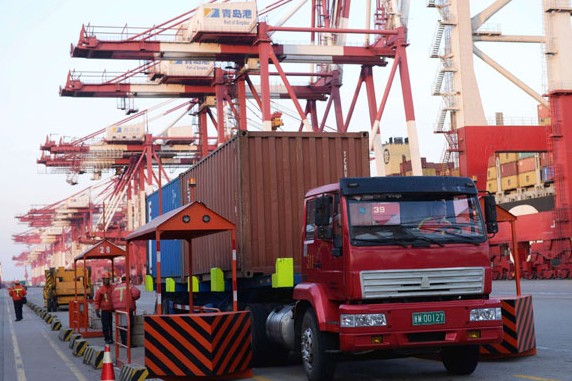

A truck carries a container at the Qingdao port in Shandong province. Organizations such as the International Monetary Fund and the World Bank have long forecast the inevitability of China's ascent to the top of the global economic ladder, but probably not until 2020 or even 2024. YU FANGPING/CHINA DAILY
China ready to overtake US years earlier than international economists expected
Far sooner than expected and predicted, it appears that China is on the verge of overtaking the United States as the world's largest economy. Organizations such as the International Monetary Fund and the World Bank have long forecast the inevitability of China's ascent to the top of the global economic ladder, but not until 2020 or even 2024.
However, an announcement recently by the World Bank's International Comparison Program in Washington asserts that China's ascent may take place as early as this year, according to analyses based largely on purchasing power parity.
While the ICP's methodology has attracted as much criticism as attention, it does paint an important part at least of the picture of the shifting balance of economic power from West to East. The ICP's recent announcement highlights the growing power of the Chinese economy and the speed of its spectacular rise.
According to the ICP's PPP-based calculations, China's economy accounted for only 43 percent of the US economy in 2005, rising to 87 percent in 2011.
There are two limitations in the ICP's PPP approach. The first is the fact that money tends to "go further" in poorer, less-developed countries where prices are generally lower. The second is the apparent omission of any key economic indicators on a per capita basis. According to the Organization for Economic Co-operation and Development, the average income in China was 75 percent of the global average while that in the US was 370 percent.
Still, the ICP's figures highlight China's rapidly rising global economic power and should also stimulate discussion and debate on the speed of China's economic transformation and the path this may take over the coming years.
Before attempting to plot the trajectory of China's economic future, it is imperative to learn from the nation's economic emergence since the birth of the "Open Door" policy in the late 1970s. Looking back, it is clear that a nonlinear relationship appears to exist between economic emergence and time in the case of China.
December 1978 may have marked the commencement of China's opening up to the international business community, but economic growth did not really take off until the early 1990s, at which time a quantum leap in foreign direct investment provided an "accelerator" effect.
If the ICP's recent announcement is soon accepted as the start of China's inevitable rise to the top of the global economic tree, then a repeat of the early 1990s "accelerator" effect may well recur.
Chinese business still lacks confidence and is held back by a relatively conservative approach to international expansion, but establishment as the world's leading economy may well contribute to soaring confidence and creativity across China's business community.
Finally and fundamentally, a nonlinear relationship between China's economic emergence and time is highly likely to continue with the disproportionately modernizing influence of China's younger generations, especially those whose formative years took place soon after the early 1990s.
The ICP's report and more similar announcements will only serve to galvanize and empower China's younger generations, already bursting with entrepreneurial ambition.
Of course, the ICP's announcement should be greeted with caution, but China's economic competitors should react with anything but caution as China's miraculous march to the top continues.
Once China reaches the top, expect to witness an even more dramatic shift up the economic gear levers.
The author is a visiting professor at the University of International Business and Economics in Beijing and a senior lecturer on marketing at Southampton Solent University's School of Business.
Don‘t read too much into PPP ranking
2014-05-05China‘s GDP to overtake US in 2022
2013-11-21China to surpass US economy by 2017
2013-02-05Copyright ©1999-2018
Chinanews.com. All rights reserved.
Reproduction in whole or in part without permission is prohibited.